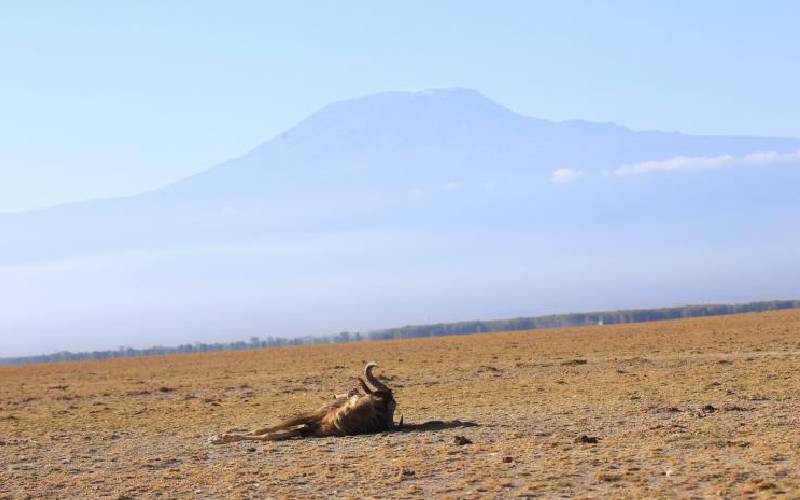
According to the International Fund for Animal Welfare (IFAW) and the Kenya Wildlife Service (KWS), rains that have been experienced within the ecosystem after a long dry spell is in short supply. [Wilberforce Okwiri, Standard]
Kenya's idyllic Amboseli eco system has lost some 6,093 wildlife as a result of ravaging drought between June and November 2022.
According to the International Fund for Animal Welfare (IFAW) and the Kenya Wildlife Service (KWS), rains that have been experienced within the ecosystem after a long dry spell is in short supply.
"Though rains has returned to the Amboseli ecosystem, it is too little, too late, for thousands of wildlife that have already perished in Kenya's worst drought in 40 years," the agencies said.
In a statement, IFAW said that Kenya's so-called "short rains" season has also delivered below-average rainfalls, making it the fifth-consecutive period of below-average rainfall.
Conservationists say the deadly drought - believed to be the worst in 40 years - has killed more wildlife in Amboseli than any other on record.
Reliable information accessible to KWS and IFAW indicates that Amboseli ecosystem lost 6,093 animals in total to this drought between June and November 2022.
This represents 20 species of wildlife including 127 elephants (33 adult, 25 sub-adults and 69 calves), 3,872 wildebeest, 1,395 Common zebra, 131 Thomson's gazelle, 174 Grant's gazelle, 106 impala, 52 buffalo and 93 endangered Masai giraffe.
The last drought in Kenya was during 2009-2010 when 200 wildebeest, 60 elephants, and 95 zebras died.
"Sadly, the short rains weren't enough in quantity and extent to facilitate new seedlings to sprout and reseed the lands. The environment remains barren and starved of new vegetation vital for wildlife," said Evan Mkala, Program manager for IFAW.
"It has left grazing for wildlife and the cattle of traditional Maasai herders in short supply. Experience has taught us that it will take at least three years of continuous rains before everything returns to normal," said Mkala.
Mkala noted that IFAW's interventions in the area have been focused on not just mitigating the situation but also building resilience among communities.
"The drought has been caused by climate change with disasters such as this anticipated to only get worse. We cannot afford to provide short term solutions, we need long term action and change," the official said.
Mkala said Programs like IFAW's Jenga Mama project are geared to help the community and wildlife become resilient and adjust to the increasing impacts of climate change while maintaining their livelihoods.
Jenga Mama - funded by (MBS) the Margarete-Breuer Stiftung Foundation - trains women in vocational skills to ensure their financial independence and support their families.
IFAW's Daisy Ochiel says that despite many Maasai girls and women required to leave school to help find pasture for the cattle, Jenga Mama students and other IFAW sponsored students have been allowed to continue with their studies.
"Right from the start we did a lot of sensitisation and worked hard to educate the community on the importance of diversifying their income and not relying as heavily on livestock for income. The community understands educating and training girls and women will open a door to another source of income for them," said Ochiel.
 The Standard Group Plc is a multi-media organization with investments in media
platforms spanning newspaper print
operations, television, radio broadcasting, digital and online services. The
Standard Group is recognized as a
leading multi-media house in Kenya with a key influence in matters of national
and international interest.
The Standard Group Plc is a multi-media organization with investments in media
platforms spanning newspaper print
operations, television, radio broadcasting, digital and online services. The
Standard Group is recognized as a
leading multi-media house in Kenya with a key influence in matters of national
and international interest.


